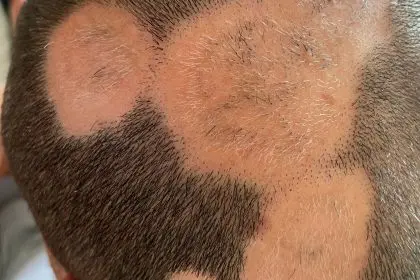Weight loss journeys often come with unexpected challenges, and hair loss ranks among the most distressing experiences for many individuals. Understanding the intricate relationship between body transformation and hair health becomes crucial for maintaining both physical and emotional well-being.
The Biological Mechanism of Hair Loss
Nutritional Disruption and Hair Cycle
Weight loss triggers a complex series of biological responses that can dramatically impact hair growth. The human body prioritizes essential functions during significant metabolic changes, often redirecting nutrients away from hair follicles.
Hair follows a precise growth cycle consisting of three distinct phases:
- Anagen (active growth phase)
- Catagen (transitional phase)
- Telogen (resting phase)
Nutritional stress can prematurely push hair follicles into the telogen phase, resulting in increased shedding and reduced hair density.
Key Factors Influencing Hair Loss
Nutritional Deficiency Pathways
Hair loss during weight transformation can be attributed to several key factors, particularly:
- Protein insufficiency: Protein is essential for hair structure, and a lack of it can lead to nutrient-starved hair follicles.
- Micronutrient depletion: Deficiencies in vitamins and minerals like zinc and iron can weaken hair follicles, contributing to hair loss.
- Metabolic stress: Rapid weight loss can induce stress on the body, which affects hair growth.
- Hormonal fluctuations: Weight loss can cause hormonal imbalances, such as changes in thyroid hormones and cortisol levels, impacting hair production.
The body prioritizes vital organ functions over hair production when protein intake is insufficient, which can halt or slow hair growth.
Physiological Stress Responses
Body’s Survival Mechanism
When undergoing significant weight loss, the body enters a survival mode where energy and nutrients are diverted to more essential processes. This mechanism is essential to help the body adapt, but it can have consequences on hair growth:
- Reduced thyroid hormone production: Slower metabolism can reduce hair growth cycles.
- Decreased testosterone levels: Lower testosterone levels, often due to calorie restriction, can influence hair thinning.
- Increased cortisol secretion: The stress hormone cortisol can disrupt the hair growth cycle, contributing to hair shedding.
These hormonal changes occur naturally during weight loss and can slow hair production significantly.
Nutritional Strategies for Hair Preservation
Targeted Dietary Interventions
To combat hair loss during weight transformation, it’s crucial to implement dietary strategies that support hair health. Effective approaches include:
- Optimize protein consumption: Aim to consume enough protein to support hair health, as it is a primary building block for hair follicles.
- Enhance micronutrient intake: Make sure to include key nutrients like zinc, biotin, and iron, which support healthy hair growth.
- Maintain balanced nutritional profile: A well-rounded diet ensures that all necessary nutrients are available to prevent deficiencies.
- Support metabolic stability: Stabilizing metabolism can help prevent hair loss during weight loss.
Critical Nutritional Recommendations
Protein and Micronutrient Guidelines
A targeted approach to nutrition can help preserve hair:
- Consume 1.2 to 1.5 grams of protein per kilogram of body weight: Ensuring adequate protein intake is essential for supporting hair growth.
- Integrate zinc-rich foods: Zinc is a vital mineral that helps with protein synthesis and cellular repair, which are crucial for hair health.
- Prioritize comprehensive nutritional balance: Ensure your diet includes a range of vitamins and minerals to promote healthy hair.
- Consider targeted supplementation: In cases of nutritional gaps, supplements such as biotin or zinc can be beneficial.
Zinc-Rich Food Sources
Zinc plays a vital role in hair follicle health. Zinc-rich foods include:
- Lean protein sources: Chicken, turkey, and fish provide high-quality protein essential for hair repair and growth.
- Dark leafy vegetables: Kale, spinach, and other greens provide key micronutrients that support overall health and hair growth.
- Nuts and seeds: These are rich in essential fatty acids and zinc.
- Whole grains: Brown rice, quinoa, and oats are high in fiber and zinc, supporting hair health.
- Lean beef and eggs: Both of these provide zinc and protein, which are critical for hair regeneration.
Supplementation Considerations
Strategic Nutritional Support
If necessary, supplementation can help fill any nutritional gaps:
- Multivitamin complexes: These provide a broad spectrum of nutrients to support overall health and hair growth.
- Zinc supplements: If you’re not getting enough zinc from food, supplements can provide the necessary levels to support hair health.
- Biotin formulations: Biotin is often used to strengthen hair and may help reduce shedding.
- Specialized hair growth nutrients: Supplements designed specifically for hair may contain a combination of vitamins and minerals, such as biotin, zinc, and folic acid.
Holistic Hair Health Approach
Comprehensive Management Strategies
To maintain hair health during weight loss, it’s essential to take a comprehensive approach:
- Maintain consistent nutritional intake: A steady supply of nutrients ensures that the body has what it needs to maintain hair growth.
- Monitor weight loss progression: Rapid weight loss can exacerbate hair shedding, so a gradual approach is often preferable.
- Implement gradual transformation strategies: Aim for a steady, healthy weight loss process that minimizes metabolic stress.
- Consult healthcare professionals: Professional guidance can help you address any nutritional deficiencies and develop a suitable plan to protect hair health.
Psychological Considerations
Emotional Wellness During Transformation
Hair loss can cause emotional distress, particularly when individuals are focused on transforming their appearance. It’s essential to understand that hair loss during weight loss is usually temporary and can be managed with the right strategies.
Potential coping strategies include:
- Seeking support groups: Connecting with others who are experiencing similar challenges can provide emotional support.
- Practicing stress-reduction techniques: Techniques like mindfulness, yoga, or meditation can help manage the emotional toll of hair loss.
- Maintaining realistic expectations: Recognizing that hair loss is a common and temporary issue can help maintain psychological resilience.
- Focusing on overall health improvements: Shifting the focus to the long-term benefits of weight loss can reduce the emotional impact of temporary hair loss.
Long-Term Perspectives
Recovery and Regeneration
For most people, hair loss during weight transformation is a temporary condition. With the right nutritional support and time, hair growth typically resumes within 3-6 months. Key factors for recovery include:
- Stabilized weight: Once the weight loss process stabilizes, hair follicles are less likely to be affected by metabolic stress.
- Balanced nutritional intake: Ensuring that nutritional needs are consistently met helps support healthy hair growth.
- Reduced metabolic stress: Gradual weight loss strategies help prevent excessive stress on the body and hair follicles.
- Hormonal rebalancing: As hormonal levels stabilize, hair growth can return to normal patterns.
With patience and proper care, hair loss associated with weight transformation can often be reversed, allowing individuals to achieve both their weight loss and hair health goals.
Weight loss-induced hair loss represents a complex biological phenomenon requiring comprehensive understanding and strategic intervention. By implementing targeted nutritional strategies and maintaining a holistic approach to health, individuals can successfully navigate this challenging aspect of body transformation.
The journey of weight loss is deeply personal and multifaceted. Recognizing the potential for temporary hair changes allows individuals to approach their health transformation with knowledge, patience, and compassion.















